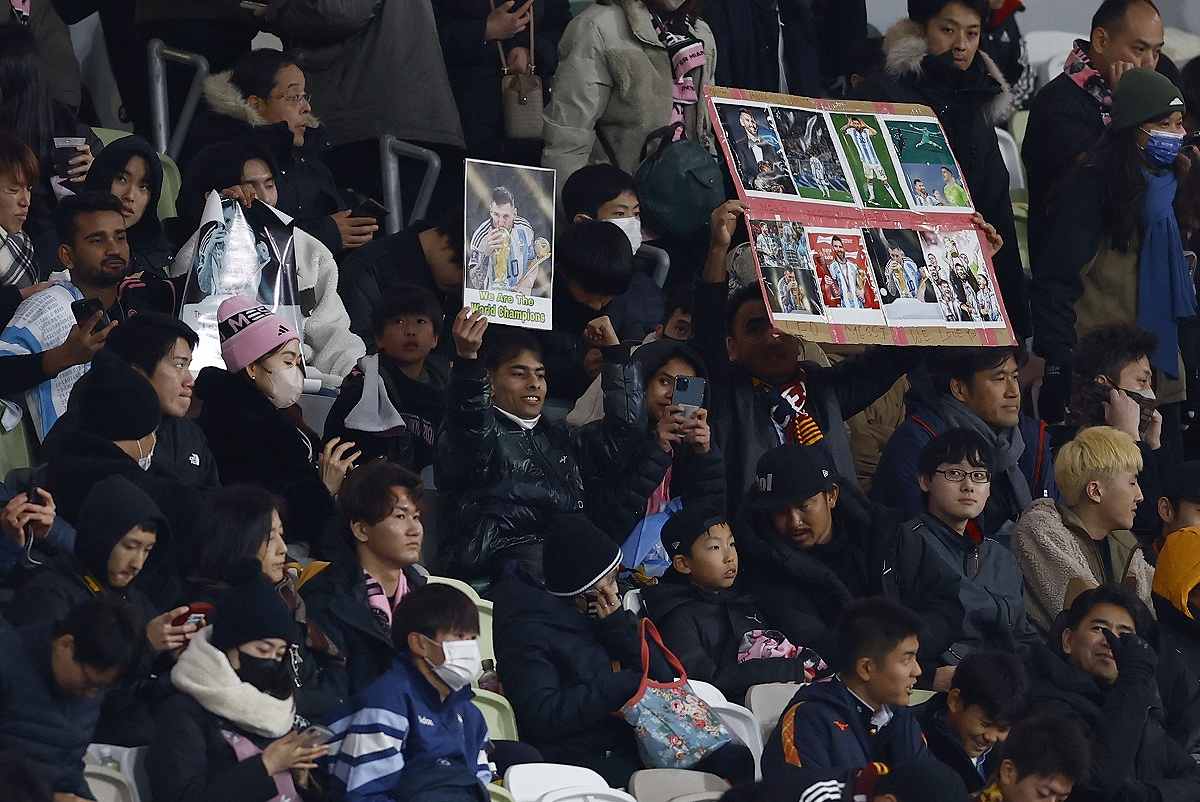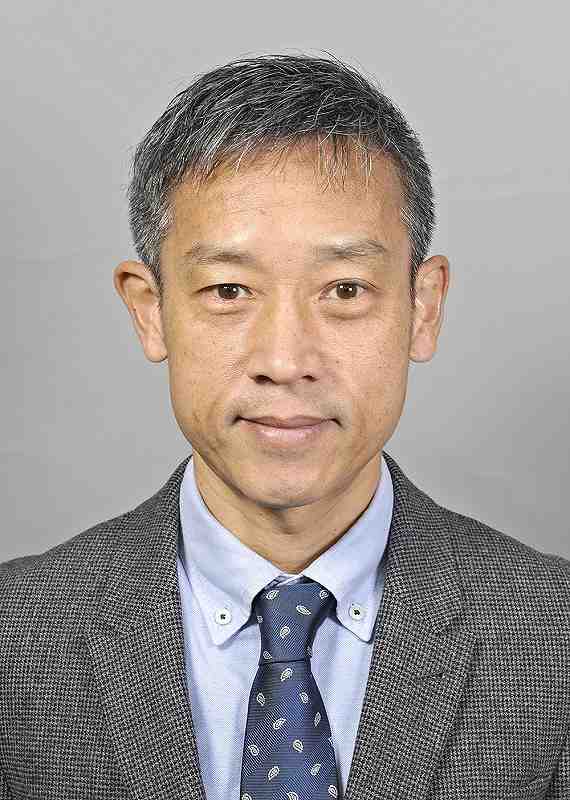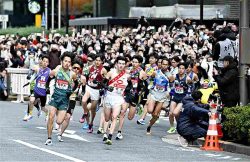
Vissel Kobe v Inter Miami – Japan National Stadium, Tokyo, Japan – February 7, 2024 Fans in the stands during the match
8:00 JST, March 16, 2024
J.League soccer begins its season in spring. With Japan’s birthrate chronically low and its population graying at a rate unmatched elsewhere in the world, efforts to use the power of sports to protect elderly people’s physical and mental health are attracting attention. One such initiative encourages residents of retirement homes to support J.League soccer clubs, and the number of participating facilities and clubs is growing across the country.
The “Be supporters!” project was launched in December 2020 by Suntory Wellness in collaboration with the J.League. In this unique project, residents of nursing homes in various regions are asked to support their local J.League club.
The project is utilizing so-called “Oshi-Katsu.”
“Oshi” refers to a person or thing we like so much we want to recommend it to others, while “katsu” means activity. Put together, “Oshi-Katsu” is activities in which people enthusiastically support their favorite people or things, such as singers and anime characters, and share the good qualities of those people or things with others around them.
Residents of participating nursing homes choose their “Oshi” player from among the members of their local club. They put up decorations in the club’s colors and posters of the players, and make fans to get everyone in the mood. On game days, everyone wears their team’s uniform and watches the game on TV.
The J.League was founded in 1991, so older people in Japan do not always feel a close connection to soccer. “At first, some people were concerned it would be difficult for the elderly to be interested in and support the project, unless it was baseball or sumo, which are more familiar in Japan,” said Mayuko Yoshimura, the project’s promotion leader. Thanks to the “Be supporters!” project, however, “it has become very popular in many areas and homes,” Yoshimura said.
Games are played about once or twice a week, and each game lasts 90 minutes, which is not too long or too short. The rules are relatively easy to understand — a point is scored when the ball enters the goal, for example — and neither residents nor staff feel a great burden in preparing to cheer. So, even those who are watching for the first time can fully enjoy the games.
Reports have come in from all over the country of amazing changes in elderly people who have participated.
A woman in her 80s in Toyama Prefecture often forgot what she had just eaten due to dementia, but she never forgot that she had watched a game and began to look forward to the next one. Another woman in her 80s in Kobe started learning Spanish to cheer for Andres Iniesta, who was playing for Kobe at the time. And a 90-year-old man with high blood pressure found that his blood pressure stabilized the day after cheering. Other reported benefits included eating more than usual, improved sleep quality and a reduced desire to return home.
In addition, residents and staff cheering together created a sense of togetherness and equality, which brightened the atmosphere in facilities and boosted staff’s motivation. Awareness of such initiatives has led to more student visits, and there has also been a positive effect on employee recruitment.
As a result of these achievements, the number of participating senior living facilities increased from 74 nationwide in 2022, to 160 the following year. The number of participating clubs also doubled from 10 to 20.
The initiative has attracted the attention of local governments, and a cooperation agreement was signed with Gifu City in December last year to expand the number of participating nursing homes in the city. There are plans to expand such cooperation to other municipalities throughout the country.
Interest has also come from overseas. Last year, Prof. Lynda Gratton of the London Business School, who served on the Council for the 100-Year Life Era during the administration of Prime Minister Shinzo Abe, visited a facility for the elderly in Toyama City.
“In the 100-year life era, it is very important for the well-being of the elderly to share what is important to them with their peers and to work together. This is a truly groundbreaking initiative,” Gratton said. She called her husband as soon as she got back to her hotel and urged him to do the same with Arsenal.
Yoshimura, who studied alzheimer’s disease as a postgraduate student at Kyoto University, said: “Supporting people we care about stimulates the hearts and bodies of elderly people, too. I think we’ve shown that even people with dementia can have a bright future.”
In November last year, the Story of 100-Year Life Era Awards were established to recognize outstanding initiatives. The Oldest Message Award went to Shigeno Takemoto, a 107-year-old supporter of Vissel Kobe.
Takemoto, who passed away last year, left a handwritten message for the players saying, “Enjoy playing soccer until your life is over.”
Vissel Kobe’s members were moved by her words and said that they too must do their best. Until shortly before her death, Takemoto was learning Portuguese to support the Brazilian players who joined the club the previous season. Shortly after urging the staff to go to the Noevir Stadium Kobe, she passed away a week before her 108th birthday.
This is a unique initiative that touches the hearts of the elderly, boosts mental and physical health, and helps combat loneliness and isolation. It is a good example of how the power of sports can be used to solve societal problems.
Political Pulse appears every Saturday.

Yuji Kondo
Yuji Kondo is a senior writer in the Sports Department of The Yomiuri Shimbun.
Top Articles in Editorial & Columns
-

Riku-Ryu Pair Wins Gold Medal: Their Strong Bond Leads to Major Comeback Victory
-

China Provoked Takaichi into Risky Move of Dissolving House of Representatives, But It’s a Gamble She Just Might Win
-

University of Tokyo Professor Arrested: Serious Lack of Ethical Sense, Failure of Institutional Governance
-

Policy Measures on Foreign Nationals: How Should Stricter Regulations and Coexistence Be Balanced?
-

Japan’s Plan for Investment in U.S.: Aim for Mutual Development by Ensuring Profitability
JN ACCESS RANKING
-

Japan PM Takaichi’s Cabinet Resigns en Masse
-

Japan Institute to Use Domestic Commercial Optical Lattice Clock to Set Japan Standard Time
-

Israeli Ambassador to Japan Speaks about Japan’s Role in the Reconstruction of Gaza
-

Man Infected with Measles Reportedly Dined at Restaurant in Tokyo Station
-

Videos Plagiarized, Reposted with False Subtitles Claiming ‘Ryukyu Belongs to China’; Anti-China False Information Also Posted in Japan























